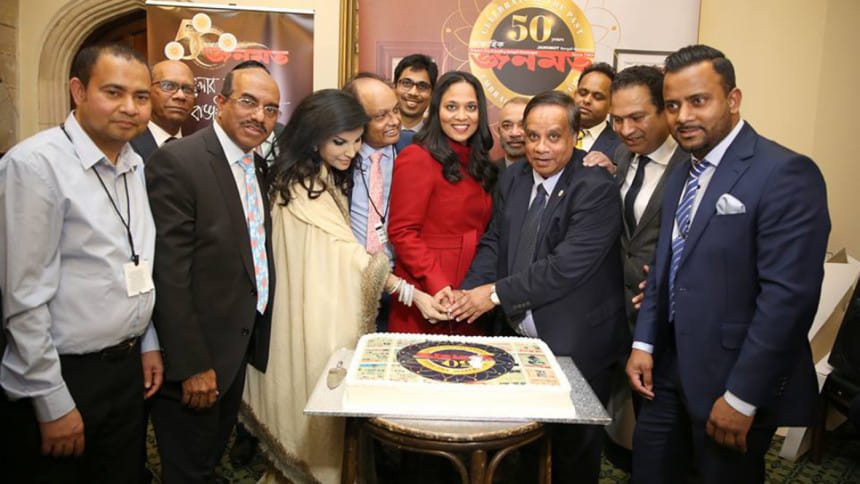UK's Bangla newsweekly celebrates 50th anniversary

Janomot, oldest Bangla weekly news magazine in Britain, celebrated its half a century of its publication.
Since its inception in 1969, the newsweekly maintained its focus on the Bengali diaspora, reads a press release today.
It is also the first ethnic minority newspaper in Britain and in particular and Europe in general.
Top newsmakers from politics and business to media and community came together in the British Houses of Parliament on March 14 to kick off a year-long celebration of the weekly's 50th year of publication.
The programme was hosted by Dawn Butler MP, Labour’s Shadow Minister for Women and Equalities. “I am incredibly proud of the achievements of Janomot and its exhilarating journey as a Black & Minority Ethnic publication,” Butler said.
“I’m delighted to have hosted the first of the celebratory events with many distinguished guests here this afternoon,” he added.
A packed programme of public events is planned throughout 2019 to mark the 50th anniversary with a Golden Jubilee Gala Dinner slated for early October in London and similar events to be held in other cities, plus at Dhaka, Chittagong and Sylhet in Bangladesh.
After the welcome address by Janomot Editor Mohammed Nobab Uddin, Editor-in-Chief Syed Nahas Pasha delivered a brief speech.
Managing Director Amirul Islam Choudhury conducted the ceremony. Janomot Director Junaid Choudhury thanked everyone for attending. One of the four founders of Janomot and former chief editor Anis Ahmed, who now lives in Bangladesh, in an emotional speech said, “I’m delighted to see Janomot survive half a century, which I believe is a milestone for the community and its readers.
“I’m very happy,” continued Ahmed, “that Janomot is adapting to the digital age, and I hope it continues the journey for another 50 years.”
Janomot Editor Nobab Uddin said, “Whilst we celebrate our splendid success, we have plans to take the leap from print-only into digital journalism to cater for an even larger, diverse audience that will include English-speaking readers.”
Editor-in-Chief Nahas Pasha added, “We are looking to embrace multi-platform journalism to provide an even deeper news experience through multimedia and interactivity.”
“Janomot’s strength is its readers who have been loyal to this publication for decades. We will be into the options of strengthening the team to reach more readers and advertisers.”
Amirul Choudhury said: It’s a massive achievement to be able to come to this day. I have been part of this remarkable journey for 23 years. And the teamwork has been great.
“Junaid Choudhury and Atique Choudhury have brought a lot of energy and we look forward to making this organisation even more dynamic in the future.” For his part, Junaid Choudhury said, “I can’t read or write Bengali but the relationship that my parents developed with Janomot as readers have inspired me to take the helm of this paper. If we get support from you all in the community, it will help this newspaper have a smooth ride.”
Among the other speakers were Minister of State for Asia and the Pacific at UK Foreign and Commonwealth Office Mark Field, Bangladesh’s High Commissioner to the UK Saida Muna Tasneem, former British high commissioner to Bangladesh Anwar Choudhury, Labour’s Bethnal Green and Bow MP Rushanara Ali, Poplar and Limehouse MP Jim Fitzpatrick, Conservative MP for Sutton and Cheam Paul Scully, Virendra Sharma, MP for Ealing Southall, UK Bangladesh Catalysts of Commerce and Industry President Bajloor Rashid MBE, British Bangladesh Chamber of Commerce and Industry’s former president Muquim Ahmed, ex-president of Bangladesh Caterers Association Pasha Khandaker MBE and Brent Council’s former mayor Councillor Parvez Ahmed.
This multigenerational publication has carved its place in the rich British heritage now, having fostered a vibrant ecosystem of ethnic media and given the British Bengali and immigrants alike a voice, they gathered guests agreed.
Founded in London in 1969, it is the oldest running Bengali newspaper in the United Kingdom, first of its kind published outside Bangladesh and one of the longest-serving ethnic minority newspapers in Britain.
Janomot has chronicled Bengalis fight against racism in Britain and Bangladesh’s battle for freedom starting with the 1969 Mass Uprising, the 1971 War of Independence, the bloody assassination of Bangladesh’s founding father Sheikh Mujibur Rahman in 1975, and restoration of democracy in 1990, to name a few.
At the time of the independence struggle in Bangladesh, Janomot newsweekly became the Bengali voice abroad, which provided a strong forum for discussion and debate on the issues affecting the Bengali people and became the mouthpiece of their aspirations.
Janomot played a pivotal role in inspiring younger British Bengali generations in the late 1970s to fight against racism and integrating into British society.
And in the 1980s, it ran a strong campaign in the community to encourage the British Bengalis to enter mainstream politics, and to encouraged parents to send their children to colleges and universities.
Over five remarkable decades, Janomot has gone a long way to promote and preserve Bengali’s linguistic and cultural diversity. It proactively advocated for the introduction of the Bengali-language curriculum in the British education system and helped Bengali language from being in severe decline or worse, from dying a slow death among the younger British-Bengali population

 For all latest news, follow The Daily Star's Google News channel.
For all latest news, follow The Daily Star's Google News channel. 



Comments